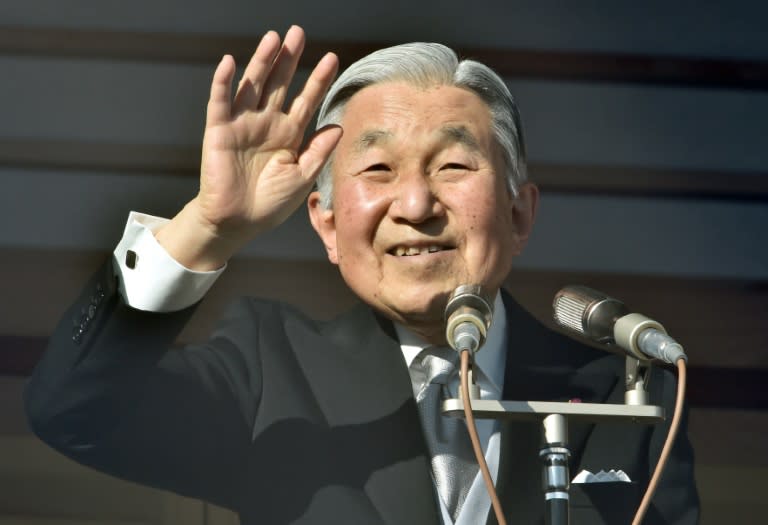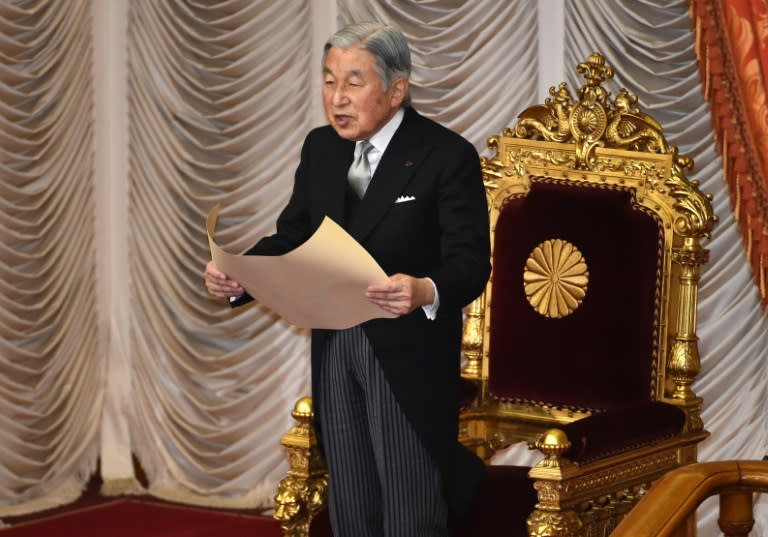Japan monarchy roiled over abdication reports
Japan's ancient monarchy was in tumult Thursday with the imperial household insisting its ageing emperor had no plans to abdicate after reports he wanted to step aside. Respected national broadcaster NHK -- citing palace and other sources -- said Wednesday that 82-year-old Akihito, who has reigned for almost three decades, wanted to pass the throne to his eldest son sometime within the next few years. Any such abdication would be the first in around two centuries, and would be a severe jolt to a country where the 2,600-year-old royal family symbolises stability and continuity. Media watchers say NHK and Kyodo News, which separately carried a similar report, would be extremely careful before committing on such an explosive story. However the Imperial Household Agency, the tradition-steeped government body that runs royal affairs, was categorical in its denial. "It is absolutely not true," Vice Grand Steward Shinichiro Yamamoto told reporters late Wednesday. The emperor "has long refrained from discussing systematic issues out of consideration for his majesty's constitutional position," he told reporters. But in the early hours of Friday, Kyodo cited government sources as saying the government had begun preparations to revise the law governing the imperial family system in response to the emperor's desire to possibly abdicate. Currently under Japan's Imperial Household Law there is no legal mechanism for abdication. Kyodo said the government set up a special task force last month under strict confidentiality, with the aim of compiling a draft outline by the emperor's 83rd birthday in December. It also said that the Imperial Household Agency was considering getting the emperor to express his own thoughts about possible abdication soon, according to agency officials. The throne, which Japan claims to be one of the world's oldest, is held in deep respect by much of the public, despite being largely stripped of its mystique and quasi-divine status in the aftermath of World War II. Akihito's father, Hirohito, in whose name Japan's military campaigns of the 20th century were prosecuted, was treated as a living god until defeat in 1945. He died from cancer in 1989. While the role of emperor is now largely ceremonial, it remains intensely important to right-wingers, especially because of the monarch's position at the apex of the native Shinto religion. Among their number is Prime Minister Shinzo Abe, who at the weekend scored an election win that may give him the momentum to soften Japan's pacifist constitution. An abdication could throw a spanner in the works, tying up legislators and preventing any such constitutional backsliding. - 'Mistakes' - Hidehiko Kasahara, professor of politics at Keio University, noted that Akihito has made clear his ceremonial workload was getting harder to perform. One of his sons in 2011 floated the idea of a retirement system for emperors after one of Akihito's illnesses, and a weekly magazine in 2013 carried a report similar to the current wave of speculation. The emperor, who has suffered from numerous health issues, including prostate cancer and heart problems, himself spoke late last year of his growing limitations. He acknowledged making "mistakes" in his duties, which range from native Shinto religious ceremonies to visiting residents in regions hit by Japan's frequent natural disasters. Akihito's reign as emperor, now in its 28th year, has been characterised by an unprecedented openness. He has made efforts to acknowledge suffering caused by Japan's 20th century warring in visits to the Philippines and other Pacific battle spots, and last year in Tokyo expressed "profound remorse" for the war. Jeff Kingston, professor of Asian Studies at Temple University Japan, said lost in discussions was not so much the technical issue of abdication but rather what Akihito has meant to his country as domestic "healer in chief" and "emissary of regional reconciliation" abroad. "His acceptance of Japan's war responsibility and his apology diplomacy have done a great deal to raise Japan's stature in the comity of nations," he said.




